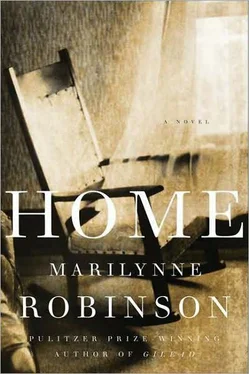He was still standing there, with the book in his hand. “W.E.B. DuBois,” he said. “Have you heard of him?”
“Well, yes, I’ve heard of him. I thought he was a Communist.”
He laughed. “Isn’t everybody? I mean, if you believe the newspapers?” He said, “Now I suppose you’ll think I’m up here reading propaganda.”
“I don’t care what you’re reading. All I really care about is whether we can live in this house like civilized people.” They heard the creak of bedsprings, and they heard the clack of a cane falling to the floor. “Coming, Papa!”
Jack said, “It’s hard, Glory. I know what you think of me.”
“Well, that’s more than I know.”
“Are you serious?”
“I’m completely serious.”
They heard a clatter. She shouted, “I’m coming!” and ran down to the kitchen, and there was her father standing beside a chair that had fallen on its back. He was wearing his robe and one slipper and his hair was awry. He regarded them with anxiety that was in some part irritation. He was holding the Monopoly set. “I thought we might amuse ourselves with this. A game or two. I’d better sit down now.” She helped him into a chair. “You know how it is when you jump up from a sound sleep. I thought something bad had happened—” and he fell into that doze of his that might have been prayer.
Jack took out the board, the money, and the dice. “I’m the top hat,” he said.
Their father said, “Well, I’m something. I don’t know quite what I am.” He closed his eyes. “I guess I’m going to finish that nap anyway, so I might as well get comfortable.” Jack helped him to his armchair. Then he came back to the kitchen.
Glory said, “I’m the shoe.”
“The shoe?”
“I know. But it’s lucky for me.”
He laughed. “You play a lot of Monopoly?”
“About a thousand times more than I ever thought I would.”
After four turns she had bought two utilities.
“Well,” Jack said, “that looks pretty insurmountable. I see what you mean about the shoe.”
“You’re ready to concede?”
“More than ready.”
Jack put the game away, squaring up the deeds and the money as if it mattered.
Glory said, “How do you know I’m not a Communist?”
He laughed. “You’re too nice a girl.” Then he said, “Not that that means anything. I’m not a Communist either.”
“I’m thinking of reading up on it. Marxism.”
“DuBois isn’t a Communist. Not really.”
“I wasn’t hinting,” she said. But she was. She thought if she read his book they might have something to talk about. “I’d go down to the library to see if they have anything, but the MacManus sisters work there and I can’t face talking to either one of them.”
“You go to church.”
“Last in, first out. I have to do that. It matters to Papa.”
THE CHURCH OF THEIR CHILDHOOD WAS GONE, THE WHITE clapboard church with the steeply pitched roof and the abbreviated spire. It had been replaced by a much costlier building, monumental in style though modest in scale, with a crenellated Norman bell tower at one corner and a rose window above the massy entrance. Someone whose historical notions were sufficiently addled might imagine that centuries of plunder and dilapidation had left this last sturdy remnant of grandeur, that the bell tower might have sunk a dozen feet into the ground as ages passed. The building was reconsidered once or twice as money ran out, but the basic effect answered their hopes, more or less. “Anglicanism!” her father had said, when he saw the plans. “Utter capitulation!” His objections startled the elders, but did not interest them particularly, so they drew discreet conclusions about his mental state. Nothing is more glaringly obvious than discretion of that kind, since it assumes impaired sensitivity in the one whose feelings it would spare. “As if I were a child!” her father said more than once, when the decorous turmoil of his soul happened to erupt at the dinner table.
This was a grief his children had never anticipated. Nor had they imagined that their father’s body could become a burden to him, and an embarrassment, too. He was sure his feebleness inspired condescensions of every kind, and he was alert for them, eager to show that nothing got past him, furious on slight pretexts. The seven of them telephoned back and forth daily for months. He was in graver pain than he was accustomed to, and his dear old wife was failing. He was not himself. Ames sat with him for hours and hours, though even he was not above suspicion. They pooled strategies for softening the inevitable blow of his retirement, which would have been a mercy if it had come about under other circumstances. Ah well. He came back to himself, finally, reconciled to loss and sorrow and waiting on the Lord.
Now Glory was the family emissary. At holidays they went as a delegation, there to signal reconciliation not quite so complete as to induce her father to struggle up those stone steps. The no longer new pastor was youngish, plump, smiling. His admiration for Reinhold Niebuhr brought him to the brink of plagiarism now and then, but he meant well. She was always the object of his special cordiality, which irritated her.
For her, church was an airy white room with tall windows looking out on God’s good world, with God’s good sunlight pouring in through those windows and falling across the pulpit where her father stood, straight and strong, parsing the broken heart of humankind and praising the loving heart of Christ. That was church.
SHE PUT JACK’S TEN-DOLLAR BILL IN THE DRAWER WHERE they had always kept cash for household expenses. Every week someone from the bank came by with an envelope. She noticed that the amount it contained had gone from fifty dollars to seventy-five. Another telephone call. Even fifty dollars was never needed. When the week was over, she put whatever remained in the piano bench, for no particular reason except that her father’s arrangements were no business of hers, and the cash drawer would overflow if she didn’t put the excess somewhere else. She put Jack’s ten dollars in an envelope of its own. That he had had it ready must have meant that he had decided how much he could spare. That he had given it to her — well, he always did act as though the house was not quite his, nor the family, for that matter. There was a gravity in the gesture, in the fact that he had intended it for hours or days before he had made it, and that he must have known the amount could not have mattered to anyone but him and yet pride had required him to give it to her. There was an innocence about it all. She felt she should be careful not to spend that bill as if it were simply ordinary money.
Every day Jack waited for the mail. However else he might while away his time, he was always somewhere near the mailbox when it came, the first to look through it, though it seemed none of it was ever for him, except once, three days after he arrived. It was his birthday, which she had forgotten. There were six cards for him, from the brothers and sisters. He opened one and glanced at it and left it with the others, which he did not open, on the table in the hallway. “Teddy,” he said. “He’s glad I’m here. He’s looking forward to Christmas.”
“Teddy’s glad I’m here, too,” she said. “They all are.”
He laughed. Then he asked, “Is it so bad for you, being here?”
“Let’s just say it isn’t what I had in mind.”
“Well,” he said, “poor kid.”
That was brotherly, she thought, pleasing in a way, though it came at the cost of allusion to her own situation, which she always preferred to avoid. What did he know about it? Papa must have told him something. She resented the condescension in “poor kid.” But brothers condescend to their sisters. It is a sign of affection.
Читать дальше












